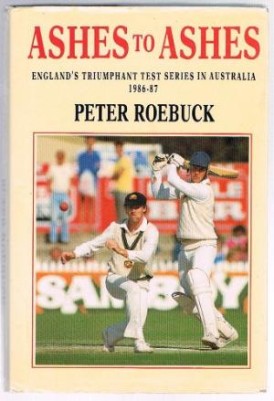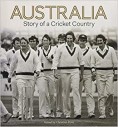Ashes to Ashes: England’s Triumphant Test series in Australia, 1986-87
Jon Gemmell |Published: 1987
Pages: 209
Author: Roebuck, Peter
Publisher: Guild Publishing
Rating: 4 stars

This was the very first cricket book that I read and what a great one to start with. As an analysis of the England tour down under, it offered so much besides the actual cricket. As The Sunday Times journalist, Peter Roebuck writes what he calls a number of colour-pieces that provide range, digress and go off on various tangents.
There are seven chapters called interludes which take place between the matches. They deal with issues such as the conspiracy against Pope John Paul I (his predecessor is in town) and liberation theology. Prime Minister Hawke is dissected as someone who is confident and brash, yet hides a shyness and vulnerability. You wonder if there’s not a sense of the autobiographical when Roebuck notes that Hawke, like so many apparent extroverts, seems to need the blessings of love and success. He also writes with some feeling on the genocide of the Aborigines in Tasmania, and the cover-up of a Japanese air attack on Darwin in World War Two where the supposedly macho-Aussie fled for the hills.
Roebuck would spend many of his later years in Australia where, it could be argued, he was better appreciated. He was already writing for The Age and The Sydney Morning Herald and felt confident enough to share his insights into the Aussie character. They are less stuffy than the Poms and therefore it was surprising when captain Alan Border walked out to toss on the opening day of the first Test in a blazer. It is a diverse country, and a tolerant one at that, apart from the appalling treatment of the Aborigines.
Roebuck writes with a wit that leaves you smiling on most pages, especially as reading it today affords one the luxury of hindsight. England captain Mike Gatting was finding it difficult to impose his authority upon a team that featured two ex-captains. Whilst used to being the boss he was seen by his peers as an invader who didn’t really belong. He is described as not as intelligent or experienced as some of his charges; not a man of books. He comes across as neither fit nor articulate and can be rude. He also complained that some of the players led a too hectic social life! Yet, by the end of the tour Roebuck concedes that he has led his team very well. His counterpart Alan Border, on the other hand, represented a pugnacious democrat resisting the patrician English.
His profiles of Somerset teammate Ian Botham are absorbing. The England all-rounder had agreed to play for Queensland as their overseas player and this would be his last tour with England for some time. This was a place where Joh Bjelke-Petersen had won the election on 32 per-cent of the vote and then passed a law making it illegal for publicans to serve gays and lesbians. It was big, brassy, noisy and aggressively masculine, an ideal fit for the Beef. Botham on tour was a man who enjoyed being surrounded by friends, yet was nearly always alone and seemed to exist on the edge of the team.
We are also reminded of an earlier era where we followed cricket by setting the alarm clock to listen to the radio. It is unlikely that a leading player would today attend a fancy-dress party wearing a Gestapo outfit, nor that his side Leicestershire will be described anytime soon alongside Middlesex and Lancashire as ‘a big club’
Then there is something on the cricket as well. This Ashes was for the wooden spoon. Australia are denounced repeatedly as being a poor side, scarcely a county attack. Many of their best players had sold their souls for the krugerrand. England’s victory featured some stand-out performances, notably Chris Broad who scored three centuries in successive Tests, a feat only previously achieved by Hobbs, Sutcliffe and Hammond. Peter Taylor would be plucked out of the obscurity of grade cricket to take 6-78 in England’s first innings and set up a victory for the Australians in the final (dead) rubber.
There are also a number of poetic moments such as when reciting David Gower who never moves, he drifts, and bats with courtesy and beauty. In contrast, the 21-year-old Steve Waugh bats like one imagines men batted one hundred years ago [with a] manner silent and resolute, while the Tasmanian David Boon bats as if he’s standing up for all the small and put-upon nations on this earth.
There is the odd incoherent sentence that skipped the editor’s eye, and the journal style can lead to some repetition. We know, without any doubt, that the author associates Gower with champagne and considers Boon to be overweight! These niggles aside, this was an excellent read the second time round, just as it was some thirty years ago, and the book that sparked in me a fascination with the sport’s literature.






Leave a comment